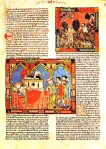XXV Congreso Internacional de la Asociación de Jóvenes Lingüistas
10, 11 y 12 de marzo de 2010, Valladolid, España.
La Comisión Organizadora se complace en anunciar el Congreso Internacional de la Asociación de Jóvenes Lingüistas (XXV Encuentro), que tendrá lugar en la Universidad de Valladolid del 10 al 12 de marzo de 2010.
En el marco de dicho Congreso, se celebrarán tres sesiones plenarias a cargo de los siguientes conferenciantes:
- Dr. D. José Antonio Pascual
- Dr. D. Teun A. van Dijk
- Dr. D. Manuel García Teijeiro
El objetivo de este Congreso es dar la oportunidad a estudiantes de todos los niveles de presentar sus investigaciones e intercambiar opiniones con otros estudiantes y profesores. De este modo, invitamos a participar en este Congreso a todos los jóvenes investigadores que trabajen en diferentes campos de la Lingüística. Asimismo, recordamos que solo los NO DOCTORES pueden presentar sus trabajos en este congreso. Por ende, no se aceptarán las autorías o co-autorías que impliquen a doctores.
Los resúmenes pueden ser enviados únicamente por vía electrónica, a través de la dirección de correo indicada al final de este documento. Los comunicantes podrán presentar sus trabajos en la lengua que prefieran. No obstante, los resúmenes deberán adjuntar necesariamente una traducción al español o al inglés. También se deberá enviar un documento con cinco palabras claves en ambos idiomas. Esto es, en la lengua de la comunicación y en español o inglés. Los resúmenes no pueden sobrepasar las 250 palabras. El formato deberá ser el siguiente:
- La medida de los márgenes será de 2,5 cms.
- El espaciado interlineal será sencillo.
- El tipo y el tamaño de letra será Times New Roman de 12 puntos.
- Se utilizará SILDoulos IPA93 para los símbolos fonéticos.
- Podrán incluirse un máximo de cinco referencias bibliográficas.
Cada comunicación tendrá una duración máxima de 30 minutos (20 de exposición más 10 de debate).
Los trabajos deberán incluirse en alguno de los siguientes campos de la lingüística:
- Análisis del discurso
- Dialectología
- Fonética y fonología
- Fraseología
- Lexicografía y lexicología
- Lingüística aplicada
- Lingüística clínica
- Lingüística histórica
- Morfología
- Pragmática
- Psicolingüística
- Semántica
- Sintaxis
- Sociolingüística
- Tipología lingüística
- Traducción
- Otros
Fecha límite para la presentación de resúmenes: 15 de diciembre de 2009
Fecha límite para la confirmación de la aceptación o rechazo de la propuesta de comunicación: 15 enero de 2010
Una vez seleccionados los resúmenes, se comunicará a los autores el resultado y se darán las normas de edición para el posterior artículo, que no deberá superar las 10 páginas y deberá entregarse el día de la ponencia.
Para más información: 2010ajl@gmail.com
Teléfonos de contacto:
983 42 30 00 (ext. 67 66) (Beatriz)
983 42 30 00 (ext. 67 56) (Ana)
983 42 30 00 (ext. 68 81) (Victoria o José Pablo)
983 42 30 00 (ext. 67 36) (Paula)
983 18 67 37 (Sofía)
Fax:
983 18 67 37



